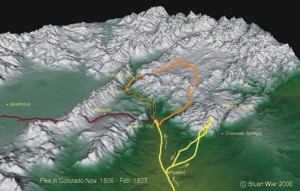Column by John Mattingly
Agriculture – March 2007 – Colorado Central Magazine
BETWEEN THANKSGIVING and Valentine’s Day, I do as little as possible on the farm. After many winters of plugging in block heaters and magnetic transmission heaters to fire up tractors to load hay or grain, I decided there was an economic and emotional benefit to hibernation. Both I and the machines groaned and staggered when commanded into action in the sub- zero temperatures of the San Luis Valley. I didn’t even blade or shovel snow unless it had us totally locked in. I simply packed the freezer with elk, tossed in vegetables from the garden, hung a bag of apples and oranges in the cellar, and made sure there were a couple of quarts of vodka in the cabinet over the sink. OK, maybe it was more like three quarts of vodka. But it was Colorado vodka. It took several years, but people eventually learned I was not going to start a tractor to load hay during this time period. I was out of it — or, more precisely, I was into winter.
In addition to reading half a dozen hard covers, drafting a farm adventure novel, and improving my chess game, my major chore was to check the mouse traps every other day in the shop and garage.
We had three cats but they didn’t do a good job of keeping the mice out of the firewall insulation of the nine tractors and two swathers in the shop, or from nibbling into various machinery seats to mine flakes of foam, or from stocking vehicle heater ducts with dry cat food. At times it seemed as if the cats actually drove the mice into the inaccessible recesses of the machinery. But when the temperature dropped below zero, a nightly occurrence, my wife let the cats into the house, where they did a sterling job of ganging up on the one or two mice who wandered into our kitchen.
Mice are easy to trap, in part because they’re very active, curious creatures, constantly inspecting changes to their niche. I found if I varied the location of the traps each time in and around the machines, and regularly changed the types of cheese on bait pads, I could keep the mice entertained enough that they ended up in the traps. If we happened to have oat hay stacked near the house, the supply of mice was almost endless. (I’ll mention here, parenthetically, that this gave me the thought that, if we faced some sort of cataclysm on earth, like several years of winter, it would be smart to stack oat hay around our house and judiciously trap the mice for food.)
During my winter respite several years back, I was headed out to the shop to check and set the traps when I came across a mouse, his feet frozen to a clear patch of ice on the concrete apron leading to the shop doors. The mouse had one hind leg lifted free of the ice and was frantically licking at the other hind leg to get it free. But just before it released, he had to put the freed leg down, and it soon re-froze. I noticed a small piece of cheese nearby that I must have dropped the day before and he apparently had stopped to feast on it, only to become trapped in the ice.
I watched the mouse for a while, as he shot quick, desperate glances at me while stepping up his efforts. I could see, being a human with basic math skills, that the time it took to lick one leg free was longer than the time it took for one leg to re-freeze. He was doomed. He would have been better off to simply accept his fate and calmly eat the cheese as his last meal. But no, the mouse persisted with the licking, as if he really had a chance. When I took a couple steps toward him, he changed his strategy to licking all four legs in quick rotation, swirling his head around from front-right to front-left to rear-left to rear-right and back to front-right, the futility of which made me smile.
WHEN THE MOUSE started to chew at his leg to gnaw it off just above the frozen foot, I decided to spare him. I peeled away my jacket, unzipped, and took a leak on him. At first, the mouse shuddered, as if expecting instant death. Only when he realized he was still alive did he sit back briefly on his haunches to brush the small icicles away from his eyes. Finally, he shook vigorously and scampered toward the shop, disappearing into a hole no more than a couple angstroms in diameter.
You might ask why I would save a mouse when my only legitimate activity over winter involved killing them. I know only that this mouse aroused a splash of compassion, not for the particulars of his situation, but for the extent of his frustration. Several times during the previous growing season I recalled being in the same predicament — frantically doing something that an outside observer would have quickly deduced as futile. And like the mouse, I got pissed off.
John Mattingly has farmed most of his adult life, although he did spend a few years owning the Palace Hotel in Salida.

